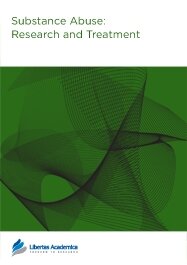

Publication Date: 27 Nov 2009
Type: Original Research
Journal: Substance Abuse: Research and Treatment
Citation: Substance Abuse: Research and Treatment 2009:3 93-98

Background: A substantial number of patients in general hospitals will evince substance abuse problems but a majority is unlikely to be adequately identified in the referral-consultation process. This failure may preclude patients from receiving effective interventions for substance use disorders.
Objectives: 1. To evaluate all referred patients for possible substance use disorders. 2. To ascertain the degree of convergence between patients referred for chemical problems and the corresponding DSM diagnosis. 3. To compare demographic data for substance abusing patients and referrals not so classified. 4. To evaluate conditions concomitant with substance use disorders.
Method: Consecutive one-year referrals (524) to consultation-liaison psychiatric services were scrutinized for chemically-related problems by psychiatric consultants.
Results: Of the referrals, 176 met criteria for substance use disorders (SUD) (57% alcohol; 25% other drugs; 18% both alcohol and other drugs). Persons diagnosed with SUD tended to be younger, male, non-Caucasian, unmarried, and unemployed. They were more likely to be depressed, have liver and other gastrointestinal problems, and to have experienced traumatic events; they also tended to have current financial difficulties. Most were referred for SUD evaluation by personnel in general medicine and family practice. Following psychiatric consultation, SUD designated patients were referred mainly to substance abuse treatment programs. The only variable related to recommended inpatient versus outpatient services for individuals with SUD was the Global Assessment of Functioning Axis (GAF) with persons having lower estimated functioning more likely to be referred for inpatient interventions.
Conclusions: These data are similar to the results of past studies in this area. Unlike previous investigations in the domain of consultative-liaison psychiatry, financial stressors and specific consultant recommendations were included in data gathering. Although the results are encouraging in that individuals with SUD were identified and potentially sent for appropriate treatment, the likelihood is that many patients with SUD remain unrecognized and do not receive necessary consultative and treatment services.
PDF (476.81 KB PDF FORMAT)
RIS citation (ENDNOTE, REFERENCE MANAGER, PROCITE, REFWORKS)
BibTex citation (BIBDESK, LATEX)

I very much enjoyed the experience of publishing with Substance Abuse: Research and Treatment. The editorial and review staff were very helpful and understanding throughout, even when a very large and complex project was being undertaken, and a range of subjects had to be reviewed. The editor was sympathetic and understanding of the author's responses, and this combined and coordinated interplay has allowed major conceptual advances to be made with major implications for the improvement ...

All authors are surveyed after their articles are published. Authors are asked to rate their experience in a variety of areas, and their responses help us to monitor our performance. Presented here are their responses in some key areas. No 'poor' or 'very poor' responses were received; these are represented in the 'other' category.See Our Results
Copyright © 2013 Libertas Academica Ltd (except open access articles and accompanying metadata and supplementary files.)
Facebook Google+ Twitter
Pinterest Tumblr YouTube